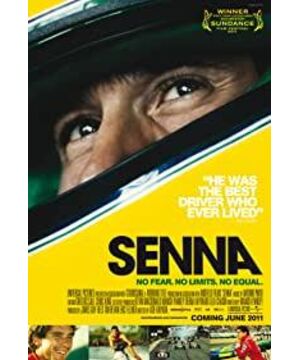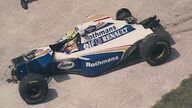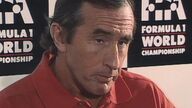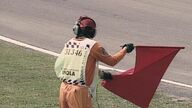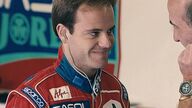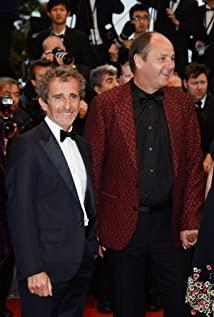Yes, Prost will not have so many documentaries. Before the accident, they were bright for a while, and after the accident, the Yin and Yang were separated. Now Prost is making his voice on TV and in RoC, Senna can only live in the film, in the voice of Murray Walker.
Death should not make him greater, death just freezes his life. What can people miss? Everything immortal. The so-called three immortality of Li Yan, Li De, and Li Xing are just materials that people will miss.
This film attempts to replay Senna’s standing. Unlike Senna's other documentaries, from the beginning, there is no hint of death, let alone deification. It's just telling a story, just like Senna's own story.
The main line of the film is his racing career, from boarding the European stadium, joining Lotus, and then to McLaren. The lens flows continuously along the time axis. The popular routine is to turn it into a chronology. "Senna" is still a chronicle, but it is a "Zuo Zhuan", with only living scenes and no paper discussions.
This is a glorious era, but it is more conflict and not plain. No film can avoid the struggle between Senna and Prost, and the treatment of this subject matter is current. "The Great Struggle", "Yunjialuzhai", "Jishengyu He Shengliang"... You can't see these stale words in "Senna". What the producer hopes may be to abandon these words which are full of gunpowder smell or have been praised and criticized. They just want to restore.
"Senna's weakness is always to show that he is stronger than others." Perhaps Prost's words are the keynote of the whole film. Senna's weakness is shown by his repeated performances in the film. At this point, the image of the Brazilian is a god without anger or a victory machine; he is just a mortal who has weaknesses like you and me and does not know how to hide.
The film records several famous battles between him and Prost. Although the voice gave him those tough remarks about not admitting defeat after the game, the camera gave him a moment of loneliness after retiring. The expression directly points to the heart, and the heart is the source of realizing a person who has passed away.
The producer manages this expression. Even suppressed to the point of suggestion. This can just avoid facializing a person. You will see Senna holding up the corners of his mouth, but then letting them go unprepared. This undercurrent of suppressing weakness is also like the slow music of the film, sometimes broken by the victory of publicity, but soon returned to the lukewarm mood.
Happiness seems to be a rare holiday. Sadly, the eternal theme of mankind-death, gradually enveloped Senna's life.
"Only at this time did he think that he might still be injured in F1." This is a deadly spot for a person who doesn't know how to retreat: no matter how strong he is, he is always weak in front of death. What I thought was that when the Buddha lived in the world, the Shakyamuni clan was still destroyed by the clan due to karma. Karma who can't escape.
Karma's flow did not become apparent until the end of the film. Senna was forced to switch to Williams to accomplish the goal of making himself strong. And this just backfired. The soundtrack at this time is a downward melody. Joy has said goodbye. At this time, the release of his love image, even if it is short, the sense of disharmony is expected.
Still advancing to that weekend, sadness overwhelmed everything. First, Barrichello had an accident, and then Ratzenberger was killed. The film stays at Senna's expression of consternation. Then came the famous conversation with the doctor. He wanted to give up and wanted to go back fishing.
This may be the only time he admits to the weakness in his heart. Although many films try to boil down to fatalism, the melody of this film shows that this is a necessity.
Perhaps Senna has the opportunity to retreat and enjoy the sunshine and love happily, and also has the opportunity to succumb to Prost. However, that moment came.
The film’s approach is not to amplify the tragedy. Although it gave a lot of space to record the process of Senna leaving the world in that buffer zone, it seemed to be whispering: he has gone, with his obsession.
Only at this moment did the film come to the stage of facing death. And only this small part is really sensational, just like the colored part at the end of "Schindler's List": those who shook hands, kissed, hugged, worked with, or fought with him, or enemies or friends, all appeared in Senna's At the funeral. The previous scenes in the film overlap with the funeral scenes. As if the morning dew, a mayfly, all the gratitude and hatred belong to tranquility.
This looping technique was strengthened in the final shot. The moment when he first came to Europe was released again. People are weak after all. They are not invincible like gods, but like babies, they are powerless in the face of the love and hate around them, hoping to become strong and hide their weaknesses, but are knocked back in front of Karma. Only by returning to the mother's womb can everything be silenced. So far, Prost's words have been interpreted more completely.
View more about Senna reviews


